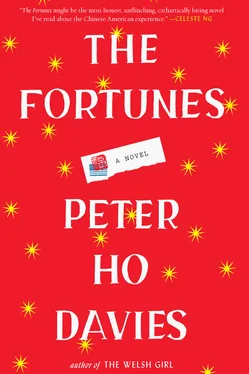John buys the English-language China Daily from him, flicks through it as he walks. A photo of a steam engine on page 3 catches his eye. It’s a Chinese locomotive in Mongolia — the last steam train in passenger service in the world, apparently — which is finally being retired. It’s being sold to the U.S. to run trips for rail buffs. Must use that somehow, he thinks, with a little spring in his step.
In the lobby he pauses to glance into the bar, looking for the girl. She’s there — still, or again? he wonders, unable to judge from her pale, drawn face. He wants to tell her to get some sleep.
He slips into the room, undresses, curls up behind Nola, nestling his leg between hers, in her yielding bed-baked warmth. For a second he pictures Pearl in her micro-skirt, slender pale legs scissoring like chopsticks, imagines being pincered between them, shivers slightly.
A viscous shaft of daylight, faintly spangled, slips between the curtains, dust motes suspended like gold. He holds his hand in the beam, but they swirl from his grasp.
Memories of their tour slide through his mind, as if he were flipping through them on his phone. The way every building for miles around the Great Wall — gas stations, convenience stores, public bathrooms — was crenellated. The expats (or rather half pats, as he’s learned they’re called) overheard in an airport bar talking about how much longer they need to work in China before they can go home wealthy — a new breed of sojourners. The terra-cotta army, thousands, probably tens or hundreds of thousands, strong, rank upon rank of men, each with a unique face. “I guess we don’t all look alike,” he’d whispered to Nola sotto voce, all the time searching for one that looked like him.
He might not know that much Chinese history or culture, but he knows something of the history of Chinese America: all the men without women, the women without husbands. The Chinese without Chinese. And yet he, and others like him, are somehow their descendants. Mongrels and bastards, orphans and warphans. No wonder we put so much stock in family, he thinks. We value nothing more than what we don’t possess.
Now that it’s morning, now that he doesn’t have to sleep, he feels himself relax at last.
Nola is agonizing when he wakes up. What do you wear to meet your new baby? It’s a moment of some ceremony, on the one hand. On the other, you’re very likely to be spat up on. He blinks at her as she holds up blouses. Plus what would the Chinese approve of? Not white, of course, that impractical, funereal color. Probably red — always auspicious (though John views all the red outfits sported by the group as a kind of sucking-up). He kisses her, slips past to the shower.
There is a nervous breakfast, everyone excited, talking in hurried, hushed tones. Bev shows off a sign Lily has made — HAPPY GOTCHA DAY LITTLE SIS!!! each letter clipped from a magazine. “She’s into collage right now. Everything looks like a ransom note!” John smiles, sips his coffee, glances across into the dark bar, now cavernously empty.
And then Napoleon herds them into a plush function room, the kind of neutral space where business conferences are held, panels and symposia. Plastic chandeliers dangle overhead, clacking gently in the air-conditioned current. The group forms an excited ring around her, camcorders chiming to life and rising up as if at a press conference, and she explains that the babies will be brought in one at a time by their carers. Couples clutch hands; the singles among them clutch photos of their children. Alice performs a slow pirouette, as if dancing alone, to take a panoramic photo. Stan and Bev lean together, touching heads — in prayer, John guesses (it occurs to him suddenly that they’re probably pro-life). He turns to Nola, squeezes her hand. “What?” she asks. “You look good,” he tells her, and she does, radiant, but her eyes are on the door. “All our lives are about to change forever,” someone murmurs, and John turns to see who — to argue the point, reflexively — and as a result he misses the door opening.
“Towson,” Napoleon calls. Stan and Bev. It won’t be alphabetical, then. The baby is a tightly bound parcel, red-faced from the cold, probably, though for a moment John fears she’s too tightly trussed. Bev bursts into happy laughter, folding her into her arms—“I could eat you up”—almost at the same moment that the baby begins to bawl and Stan, behind his camera, melts into snotty tears. Pandemonium. Flashbulbs, a smattering of applause. And then the next name, and the next. The babies are heavily dressed, as soft and plump as the plush toys they’re soon to be surrounded by. If they don’t cry, their adoptive parents do; often so do their carers. The room is dissolving in tears, John thinks, his smile of anticipation stretched tight. Already his lips and cheeks are starting to ache. Another and another. “Knowing our luck, we’ll be last,” he tells Nola, and she nods stiffly. Jeannine presses her face to the bundle in her arms, croons, “Hi, Celeste.” ( Seriously? John thinks.) Norman throws his new daughter up in the air like a football, catches her, and swoops her around the room while Amanda calls “Careful!” Eric makes unselfconscious baby talk while Scott wrings his hands.
And then everyone has a baby except them and the door is closed and they look at each other and then Napoleon. She’s moving through the crowd, counting, lips moving, and then she’s before them. A frown crosses her face, and she calls in Chinese for the orphanage official, who appears beside her. There’s an animated conversation, Napoleon’s voice rising. But in anger, alarm? Chinese has always seemed animated to John, an excitable language, but he’s not sure how to read its tones. And then Napoleon turns to them. “So sorry,” she says. She takes a breath. “Baby sick this morning, fever. Could not bring. They should have telephone. I call at once and find out more.” Her hands rest lightly for a moment on her own stomach, and John has to tear his eyes away from it, look at her face.
“Is she all right?” Nola asks, stricken, and Napoleon gives a frail smile. Her hand hovers between them and she pats the air. “I find out more, okay? Promise.”
The news is filtering through the crowd. People have been looking wide-eyed at each other, eager to share their joy, as if to make it real, and now the giddy tide of feeling has washed up against the quiet couple in the corner. Video cameras, recording all this as if it were the birth itself, turn on them — accusingly, John can’t help feeling, as if they’ve struck a wrong note on this celebratory day.
“It’s okay,” he says carefully. “They say she wasn’t too well this morning. Just a precaution, I expect. Probably didn’t want to infect the others.” He’s making this up, but it seems so plausible he’s instantly relieved. Of course that’s it. This must happen all the time. Babies get fevers all the time. It’s normal. But even as he thinks it he sees the runny noses of half the kids, hears the colicky breathing. How sick must Mei Mei be?
They all take a moment to hug them tightly on their way out — Stan and Bev, Alice, Eric and Scott, Jeannine, Norman and Amanda — and by the end John is in tears. “Oh, you poor darlings. If I could give you ours…” Bev begins. An impossible, awful offer, but heartfelt, he knows. And yet he bristles at a hidden selfishness amid all the good wishes. They — he and Nola — are everyone’s worst fear, he intuits. To come so far and be denied at the last. He detects in their faces some relief in having their fears come true — for someone else. Some things are too good to be true, unless something bad happens to make them real. You can’t believe in your own luck unless someone else is unlucky. Some price must be paid to salve their consciences.
Читать дальше












